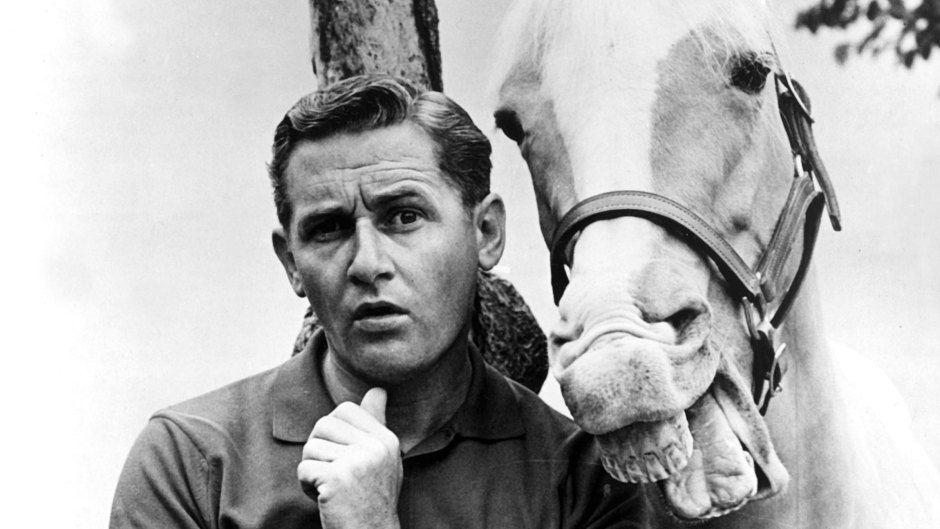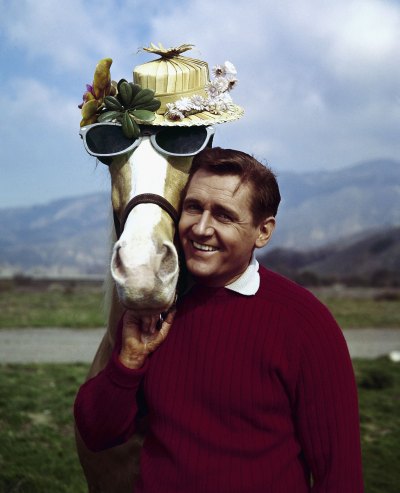
Moviestore/Shutterstock
Here’s What Happened to Alan Young Before, During and After ‘Mister Ed’: Radio, Movies and Scrooge McDuck
It’s only been four years since the death of actor Alan Young, but in many ways he seems to have been out of the public spotlight for much longer. In fact, as far as many people are concerned, his career consists primarily of the 1961 to 1966 Classic TV show Mister Ed (featuring the world’s only talking horse), but in reality he had an extensive — and acclaimed — career in a number of different mediums.
When he made the transition from radio to television in 1950, The Pomona Progress Bulletin commented, “Alan has found his medium in video. In the dozen weekly shows since his TV debut, he has come up with a parade of hilarious sketches. The television Alan Young is a comedian the radio and movie Alan Young didn’t know existed. His natural gift for pantomime, lost in radio except to studio audiences, is magnificently evident in television. His feelings for mimicry and situation comedy are suggestive of Charlie Chaplin and Harold Lloyd, although his style is strictly his own. And he is one of the few stars who actively helps write his own stuff. He couldn’t do that, until now.”
That’s some praise.

He was born Angus Young on November 19, 1919 in North Shields, Northumberland, England, to Scottish parents — his father a mine worker and tap dancer (how that for a combination?) and his mother a singer. When he was a toddler, the family moved to Edinburgh, Scotland and then, when he was six, to West Vancouver British Columbia, Canada. Bedridden through much of his childhood due to asthma, he spent many hours listening to radio shows and fell in love with the medium. Flash forward to high school and he was hosting his own comedy radio series on the CBC network. He left that gig during World War II when he began serving in the Royal Canadian Navy.
Following his time in the service, Alan moved to Toronto and picked up his radio career in Canada where he left off. There he was discovered by an American agent who brought him to New York to start appearing on American radio in 1944. This would lead to his own self-titled radio show, which ran from 1944 to 1949.
“Alan Young doesn’t believe in the tried and sometimes true perception of radio,” observed the New York Daily News on September 22, 1944. “And with good reason. For he has achieved the position of a star in American broadcasting in violation of all the recognized rules. It is almost mandatory for talent to break in on small independent stations, then switch to some network on a sustaining basis, followed by a long building-up process, being spotted as a guest at regular intervals. None of this for Young. Agent Frank Cooper brought him here ‘cold’ from Toronto, after having accidentally heard him on the air there. Immediately he was sold as Eddie Cantor’s summer replacement over on NBC. So this youngster, unknown to American radio listeners a few months ago, is now a star in his own right.”
Please scroll down for much more on Alan Young.

Rko/Kobal/Shutterstock

CBS

CBS

CBS

Clifford Ling/ANL/Shutterstock

Mgm/Kobal/Shutterstock

Mgm/Kobal/Shutterstock

ANL/Shutterstock

Nbc/Kobal/Shutterstock

AP/Shutterstock

Moviestore/Shutterstock

Moviestore/Shutterstock

Moviestore/Shutterstock

Moviestore/Shutterstock

Moviestore/Shutterstock

Nbc/Kobal/Shutterstock

Walt Disney

Susan Ragan/AP/Shutterstock








































